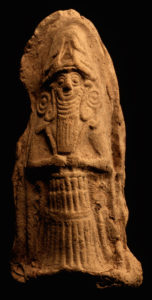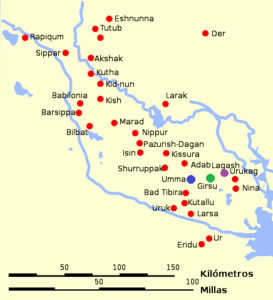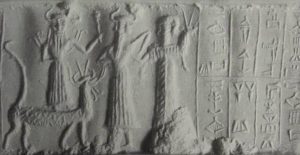http://oracc.museum.upenn.edu
(Texts: All Artifacts, Color Coding, & Writings in Bold Type With Italics Inside Parenthesis, are Added by Editor R. Brown, not the Authors, Translators, or Publishers!)
(gods in blue … mixed-breed demigods in teal)
[Esarhaddon, gre]at [king], mighty [king], king of the world, king of [Assyria],
governor of [Bab]ylon, king of Sumer and Akkad, true shepherd, favorite of the lord of lords,
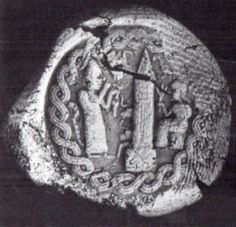 (Marduk & his spouse Sarpanit, Marduk’s rocket)
(Marduk & his spouse Sarpanit, Marduk’s rocket)
pious prince, beloved of the goddess Zarpanītu (Sarpanit, Marduk’s spouse) —
the queen, the goddess of the entire universe — reverent king
who from the days of his childhood was attentive to their rule and praised their valor,
pious slave, humble, submissive, the one who reveres their great divinity —
At that time, in the reign of a previous king, bad omens occurred in Sumer and Akkad.
The people living there were answering each other yes for no (and) were telling lies.
They led their gods away, neglected their goddesses, abandoned their rites, (and) embraced quite different (rites)
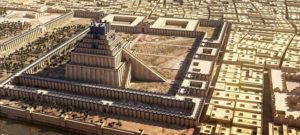 (Marduk’s Esagil residence inside his complex for gods)
(Marduk’s Esagil residence inside his complex for gods)
They put their hands on the possessions of Esagil, the palace of the gods, an inaccessible place,
and they sold the silver, gold, (and) precious stones at market value to the land Elam.

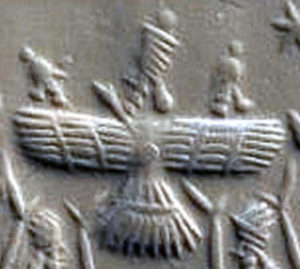 (Enlil; Enlil, father Anu, & Enki in alien sky-disc)
(Enlil; Enlil, father Anu, & Enki in alien sky-disc)
The Enlil (Earth Colony Commander) of [the go]ds, the god Marduk, became angry
and plotted evilly to level the land (and) to destroy its people.
The river Araḫtu, (normally) a river of abundance, turned into an angry wave, a raging tide, a huge flood like the deluge.
It swept (its) waters destructively across the city (and) its dwellings and turned (them) into ruins.
The gods dwelling in it flew up to the heavens like birds;
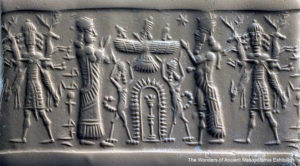
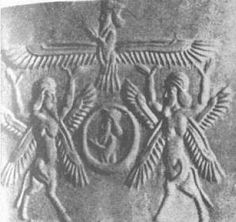 (giant king with dinner, Anu with sons Enki & Enlil in alien sky-disc, Ninhursag & Marduk in discussion; gods flew “to the heavens like birds”)
(giant king with dinner, Anu with sons Enki & Enlil in alien sky-disc, Ninhursag & Marduk in discussion; gods flew “to the heavens like birds”)
the people living in it [were h]idden in another place and took refuge in an [unknown] land.
The merciful god Marduk [w]rote that the calculated time of its abandonment (should last) 70 years,
(but) his heart was quickly soothed, and he reversed the numbers
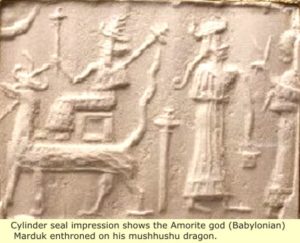 (Marduk returns to Babylon)
(Marduk returns to Babylon)
and (thus) ordered its (re)occupation to be (after) 11 years.
You truly selected me, Esarhaddon, in the assembly of my older brothers t[o] put these matters right,
and you (are the one) who placed your sweet [pro]tection over me,
swept away all of my enemies like a flood, killed all of my foes and made me attain my wish,
(and), to appease the heart of your great divinity (and) to please your spirit, you entrus[ted] me with shepherding Assyria.
At the beginning of [my] kingship, in my first year, when I sat in greatness on (my) royal throne,
[go]od signs [were] established for me;
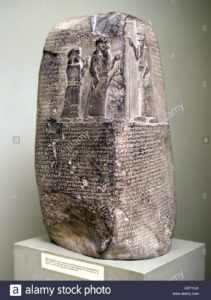 (mixed-breed king with spouse stand before Marduk, receiving instructions)
(mixed-breed king with spouse stand before Marduk, receiving instructions)
[in] heaven and on ear[th, he (the god Marduk) constantly sent me his] omen(s).
The angry [gods] were recon[ciled] (and) they repeatedly discl[os]ed favorable signs
concerning the (re)buil[di]ng of Bab[yl]on (and) the renovation of E[sag]il.
At the beginning of [my] kingship, in my first year, when I sat in greatness on (my) royal throne,
[go]od signs [were] established for me; [in] heaven and on ear[th, he (the god Marduk) constantly sent me his] omen(s).
The angry [gods] were recon[ciled] (and) they repeatedly discl[os]ed favorable signs
concerning the (re)buil[di]ng of Bab[yl]on (and) the renovation of E[sag]il.
 (bright blue-eyed god Enlil, Earth Colony Commander)
(bright blue-eyed god Enlil, Earth Colony Commander)
Bright Jupiter (Enlil), the giver of decisions on Akkad, came near in Simānu and stood in the place where the sun shines.
It was shining brightly (and) its appearance was red.
It reached (its) hypsoma for a second time in the month “Opening of the Door” and stayed in its place.
He (the god Marduk) ordered me to complete the cult centers, to renovate the shrines,
(and) to organize well the rites of Esagil, the palace of the gods.
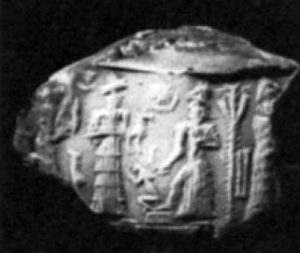 (Nannar & son Utu / Samas)
(Nannar & son Utu / Samas)
Every month, the gods Sîn (Nannar) and Šamaš together, at their appearance,
answered me with a firm ‘yes’ concerning the avenging of Akkad.
By means of the great intelligence (and) va[st] understanding [that] the sage [of the gods], the prince,
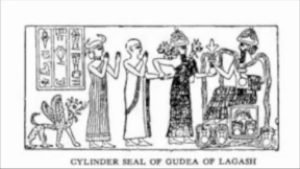 (Ninsun, mixed-breed king, Ningishzidda, & Enki, wisest of all gods)
(Ninsun, mixed-breed king, Ningishzidda, & Enki, wisest of all gods)
the god Nudimmu[d] (Enki), gave to me, it occurred to me [to] (re)populate th[at] city,
to re[novate] the shrines, (and) to make [the cult center shine, and] my heart [prom]pted (me) to perform that work.
I was afraid (and) worried to preform that work (and) I knelt before the gods
 (giant Utu & mixed-breed king; giant Adad & king)
(giant Utu & mixed-breed king; giant Adad & king) 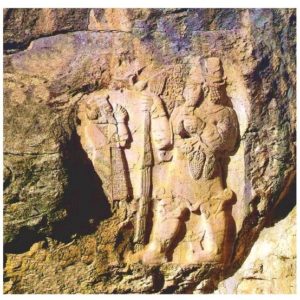
Šamaš (Utu), Adad, (and) Marduk, the great judge(s), the gods, my lords.
In the divin[e]r’s bowl, trustwor[th]y oracles were established for me,
and they had (their response) concerning the (re)building of Babylon (and) renovation of Esagil written on a liver.
I trusted in their firm ‘yes’ and I mustered all of my craftsmen and the people of Karduniaš (Babylonia) to its full extent.
I had them wield hoes and I imposed baskets (on them).
I mixed (the mud for) [its re]vet[ment] with fine oil, honey, ghee, kurunnu-wine, muttinnu-wine, (and) pure mountain beer.
[In order] to show [the people] his great [divinity and] to inspire awe (in) his lordship,
I raised [a ba]sket (iii 30) onto [my] he[ad] and [carried] (it) myself.
I [had its bricks made in brickmolds of musukkannu]-wood.
I gather[ed together (iii 35) expert craftsmen (and) skilled master] builders,
who lay ou[t plans], expo[sed the place where] Esagil [stands, and inspected] its structure.
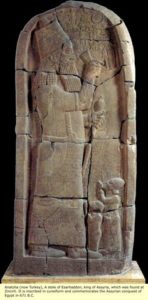
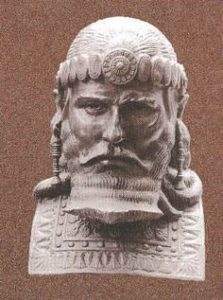 (giant Ashur & mixed-breed king Esarhaddon; Esarhaddon)
(giant Ashur & mixed-breed king Esarhaddon; Esarhaddon)
[In] a favorable month, on a propitious day, I laid its foundation platform over its previous foundations
(and) in (exact) accordance with its earlier plan I did not diminish (it) by one cubit nor increase (it) by half a cubit.
I built (and) completed Esagil, the palace of the gods, an image of the apsû, a replica of Ešarra,
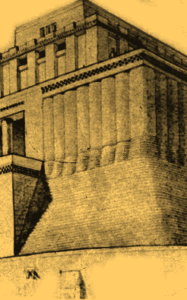 (Enki’s ziggurat residence; Pegasus)
(Enki’s ziggurat residence; Pegasus) 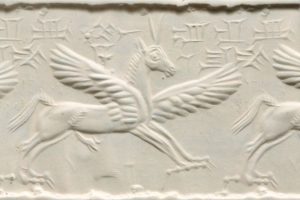
a likeness of the abode of the god Ea (Enki), (and) a replica of Pegasus;
I had (Esagil) ingeniously built (and) I laid out (iv 1) (its) square.
For its roof, I stretched out magnificent cedar beams, grown on Mount Amanus, the pure mountain,
(and) fastened bands of gold (and) silver on doors of cypress, whose fragrance is sweet, and installed (them) in its gates.
I repaired the woeful desecrated state of the gods and goddess who lived in it,
who had been displaced by floods and storm, and whose appearances had become dim;
I made their dimmed appearance bright, cleaned their dirty garments, (and) had them permanently installed on their daises.
(As for) the šēdus, lamassus, (and) rābiṣu-demons of the temple, I repaired their dilapidated part(s),
(and) [I (re)stationed] them … wh[ere] their … [are].
(No translation possible)
With the large aslu-[cubit], I measured the dimensions of [Imgur-Enlil,
its great wall] — each [length] (and) width was 30 ašlus.
I had (it) built as it was before and raised (its top) up like a mountain.
I built (and) completed Nēmed-Enlil, its outer wall, (and) filled (it) with splendor
(making it) an object of wonder for all of the people.
I established anew the remission of debts of the wronged citizens of Babylon,
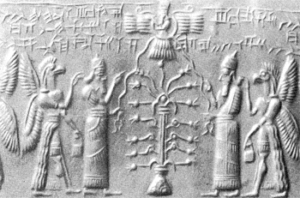 (son Enki, Anu in his sky-disc, son Enlil, & 2 eagle pilots)
(son Enki, Anu in his sky-disc, son Enlil, & 2 eagle pilots)
people (entitled to) the privileged status (and) freedom (guaranteed by) the gods Anu and Enlil.
I gathered the bought people who had become slaves (and) who had been distributed
among the (foreign) riffraff and counted (them once again) as Babylonians.
I returned their looted possessions, provided the naked with clothing, (and) let them take the road to [Bab]ylon.
encouraged them to (re)settle the city, build houses, plant orchards, (and) dig canals.
I restored their interrupted privileged status that had fallen into disuse.
I wrote anew the tablet of their exemptions.
[I] opened roads for them in all directions so that they [could establish
an imp]ortant position by having [(commercial) relations] with all coun[tries].
[…]
Let [the seed of] my [priestly offi]ce endure (along) [wit]h [the foundations of Esagil and] Babylon;
let (vi 5) (my) [kin]gship be sustaining to the people forev[er] like the pl[ant of] life
so that I may shepherd [t]heir popula[ce] in truth and justice; (and) let me reach old age, at[ta]in extreme old age,
(and) be sa[ted with] the prime [of li]fe [until far]-off [days].
Truly I am [the pr]ovider.
[Let me enla]rge [my] fa[mily], [gath]er [my] rel[atives], (and) [ext]end [my progeny so that they br]anch out widely;
[let him make] the foundations of the thro[ne of] my [priestly offi]ce [be] as secure a great mountain;
let [my] reign endure as long as heaven [and ear]th; let me str[ide] beaming daily in joy,
glad[ness], happine[ss], shining face, (and) happy mo[od]; (and) let a hap[py fate],
a g[ood] fate, (one) for the lengthening of the days of [my reign], the protection of the thro[ne of my] priestly office,
(and) the well-being of my offspring [be placed] in [their] (the gods’) mouths.
May he allow [my hands] to grasp the righteo[us] scepter [that enlarges] the land
(and) the [fierce] st[aff] that humbles the u[nsubmissive;
may they cause] my weapons [to rise up] so that I may kill my [ene]mies;
(and) [may he allow] me [to stand] over my enemies in victory (and) triumph.
Let them a[ll]ow there to be [in] my [lan]d rains and floods, successful harvests, an abundance of grain,
plenty, and [pros]perity, and let them sto[re] (it) in piles of gra[in].
I had foun[dation inscriptions] made of silver, gold, bronze, [lapis lazuli], alabaster,
basa[lt], pendû-stone, elallu-stone, (and) white limestone, (as well as) inscribed objects of baked clay,
and (then) I depicted on them hieroglyphs representing the writing of my name.
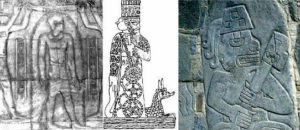 (Marduk with 2 left hands, deity in all ancient cultures)
(Marduk with 2 left hands, deity in all ancient cultures)
I wrote on them the might of the great hero, the god Marduk, (and) the deeds that I had done, my pious work,
(and) I placed (these inscriptions) in the foundations (and) left (them) [f]or far-off days.
In future days, in far-off days, may one of the kings, my descendants,
whom the king of the gods, the god Marduk, names to rule the land and the people,
read an inscription written in my name, and anoint (it) with oil, make an offering, (and) return (it) to its place.
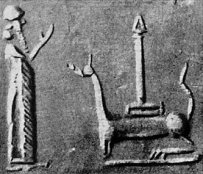 (prayers to Marduk, his Mushhushshu animal symbol & his rocket symbol)
(prayers to Marduk, his Mushhushshu animal symbol & his rocket symbol)
The god Marduk, king of the gods, will (then) hear his [pr]ayers.
(As for) [the one who c]hanges (an inscription) written in my [name], defaces my [repr]esentations,
annuls [the pri]vileged status of Babylon, (and) [bre]aks the covenant of the lord of lords,
may the god Marduk, the Enlil of the gods, the lord of the lands, look with fury on him
and order his destruction among all of the black-headed (non-mixed earthling) people.
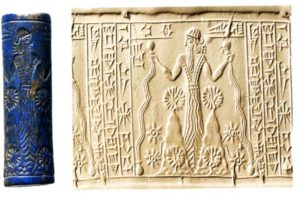 (Marduk & ziggurat pyramids)
(Marduk & ziggurat pyramids)
May he (the god Marduk) make his word bad in Ubšukkinnaku, the courtyard of the assembly of the gods,
the place of council, (and) order that his life not last (even) a single day.
Accession year of Esarhaddon, king of Assyria.
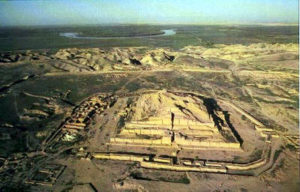 (Marduk’s ziggurat residence Esagil)
(Marduk’s ziggurat residence Esagil)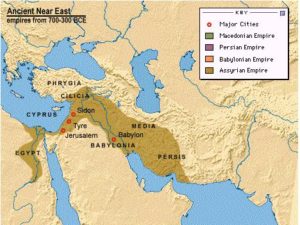 (Mesopotamian Babylon)
(Mesopotamian Babylon)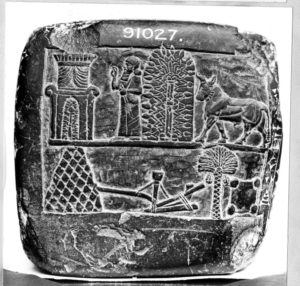 (mixed-breed King Esarhaddon before temple of Marduk)
(mixed-breed King Esarhaddon before temple of Marduk)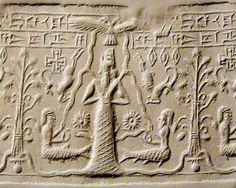

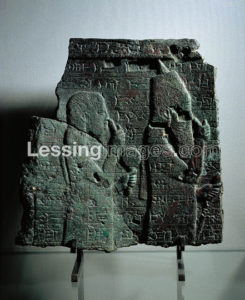
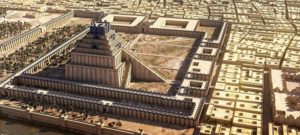
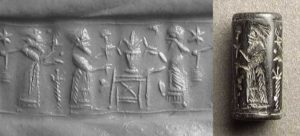

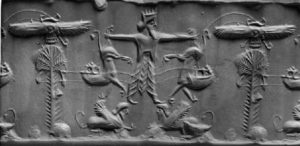
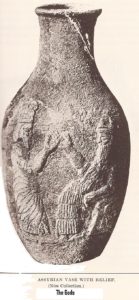 (
(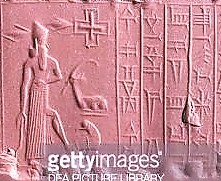
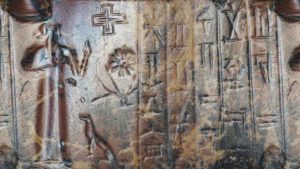
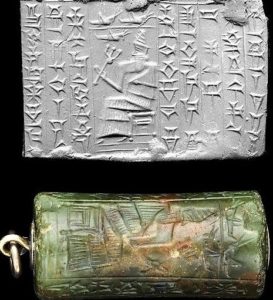
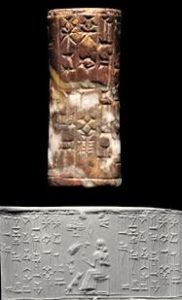
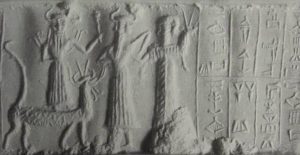
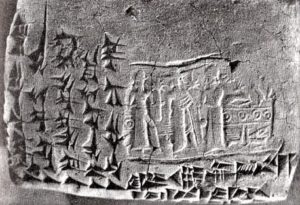
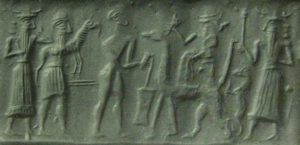

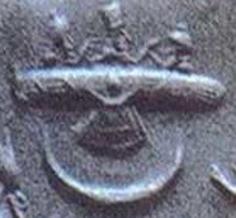
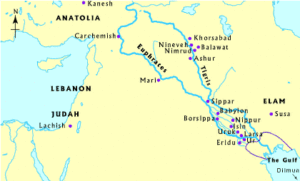 (modern man’s beginning in the land of the gods)
(modern man’s beginning in the land of the gods)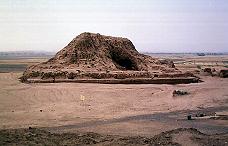
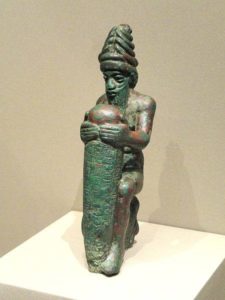


















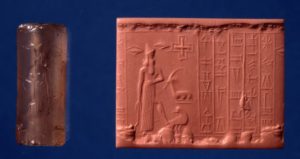
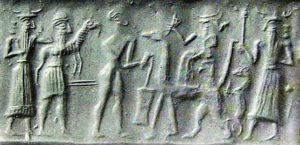
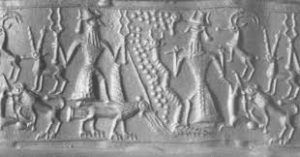 (
(